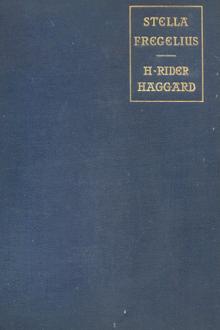The Story of the Volsungs (Volsunga Saga); with Excerpts from the Poetic Edda, - [e book reading free .txt] 📗

- Author: -
Book online «The Story of the Volsungs (Volsunga Saga); with Excerpts from the Poetic Edda, - [e book reading free .txt] 📗». Author -
The thrall hearkened, and cried out aloft, and fled away anywhither where he might hope for shelter, crying out that a hard portion was his because of their strife and wild doings, and an ill day for him whereon he must be dragged to death from his sweet life and his swine-keeping. But they caught him, and turned a knife against him, and he yelled and screamed or ever he felt the point thereof.
Then in such wise spake Hogni as a man seldom speaketh who is fallen into hard need, for he prayed for the thrall's life, and said that these shrieks he could not away with, and that it were a lesser matter to him to play out the play to the end; and therewithal the thrall gat his life as for that time: but Gunnar and Hogni are both laid in fetters.
Then spake King Atli with Gunnar the king, and bade him tell out concerning the gold, and where it was, if he would have his life.
But he answered, "Nay, first will I behold the bloody heart of Hogni, my brother."
So now they caught hold of the thrall again, and cut the heart from out of him, and bore it unto King Gunnar, but he said—
"The faint heart of Hjalli may ye here behold, little like the proud heart of Hogni, for as much as it trembleth now, more by the half it trembled whenas it lay in the breast of him."
So now they fell on Hogni even as Atli urged them, and cut the heart from out of him, but such was the might of his manhood, that he laughed while he abode that torment, and all wondered at his worth, and in perpetual memory is it held sithence. (1)
Then they showed it to Gunnar, and he said—
"The mighty heart of Hogni, little like the faint heart of Hjalli, for little as it trembleth now, less it trembled whenas in his breast it lay! But now, O Atli, even as we die so shalt thou die; and lo, I alone wot where the gold is, nor shall Hogni be to tell thereof now; to and fro played the matter in my mind whiles we both lived, but now have I myself determined for myself, and the Rhine river shall rule over the gold, rather than that the Huns shall bear it on the hands of them."
Then said King Atli, "Have away the bondsman;" and so they did.
But Gudrun called to her men, and came to Atli, and said—
"May it fare ill with thee now and from henceforth, even as thou hast ill held to thy word with me!"
So Gunnar was cast into a worm-close, and many worms abode him there, and his hands were fast bound; but Gudrun sent him a harp, and in such wise did he set forth his craft, that wisely he smote the harp, smiting it with his toes, and so excellently well he played, that few deemed they had heard such playing, even when the hand had done it. And with such might and power he played, that all worms fell asleep in the end, save one adder only, great and evil of aspect, that crept unto him and thrust its sting into him until it smote his heart; and in such wise with great hardihood he ended his life days.
ENDNOTES: (1) Since ("sidh", after, and "dham", that.).CHAPTER XXXIX. The End of Atli and his Kin and Folk.
Now thought Atli the King that he had gained a mighty victory, and spake to Gudrun even as mocking her greatly, or as making himself great before her. "Gudrun," saith he, "thus hast thou lost thy brethren, and thy very self hast brought it about."
She answers, "In good liking livest thou, whereas thou thrustest these slayings before me, but mayhappen thou wilt rue it, when thou hast tried what is to come hereafter; and of all I have, the longest-lived matter shall be the memory of thy cruel heart, nor shall it go well with thee whiles I live."
He answered and said, "Let there be peace betwixt us; I will atone for thy brethren with gold and dear-bought things, even as thy heart may wish."
She answers, "Hard for a long while have I been in our dealings together, and now I say, that while Hogni was yet alive thou mightest have brought it to pass; but now mayest thou never atone for my brethren in my heart; yet oft must we women be overborne by the might of you men; and now are all my kindred dead and gone, and thou alone art left to rule over me: wherefore now this is my counsel that we make a great feast, wherein I will hold the funeral of my brother and of thy kindred withal."
In such wise did she make herself soft and kind in words, though far other things forsooth lay thereunder, but he hearkened to her gladly, and trusted in her words, whereas she made herself sweet of speech.
So Gudrun held the funeral feast for her brethren, and King Atli for his men, and exceeding proud and great was this feast.
But Gudrun forgat not her woe, but brooded over it, how she might work some mighty shame against the king; and at nightfall she took to her the sons of King Atli and her as they played about the floor; the younglings waxed heavy of cheer, and asked what she would with them.
"Ask me not," she said; "ye shall die, the twain of you!"
Then they answered, "Thou mayest do with thy children even as thou wilt, nor shall any hinder thee, but shame there is to thee in the doing of this deed."
Yet for all that she cut the throats of them.
Then the king asked where his sons were, and Gudrun answered, "I will tell thee, and gladden thine heart by the telling; lo now, thou didst make a great woe spring up for me in the slaying of my brethren; now hearken and hear my rede and my deed; thou hast lost thy sons, and their heads are become beakers on the board here, and thou thyself hast drunken the blood of them blended with wine; and their hearts I took and roasted them on a spit, and thou hast eaten thereof."
King Atli answered, "Grim art thou in that thou hast murdered thy sons, and given me their flesh to eat, and little space passes betwixt ill deed of thine and ill deed."
Gudrun said, "My heart is set on the doing to thee of as great shame as may be; never shall the measure of ill be full to such a king as thou art."
The king said, "Worser deeds hast thou done than men have to tell of, and great unwisdom is there in such fearful redes; most meet art thou to be burned on bale when thou hast first been smitten to death with stones, for in such wise wouldst thou have what thou hast gone a weary way to seek."
She answered, "Thine own death thou foretellest, but another death is fated for me."
And many other words they spake in their wrath.





Comments (0)